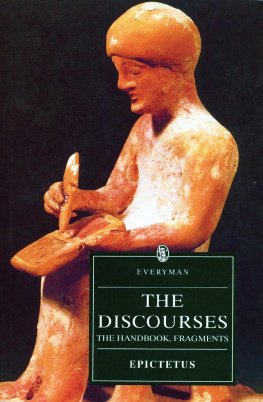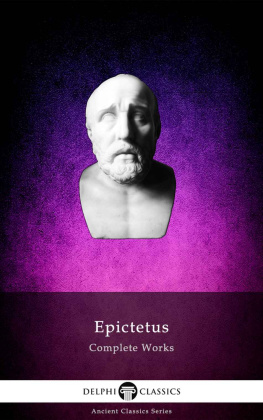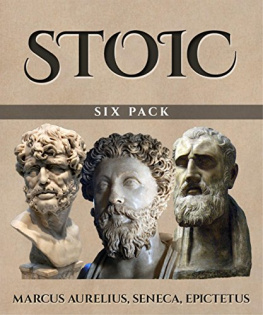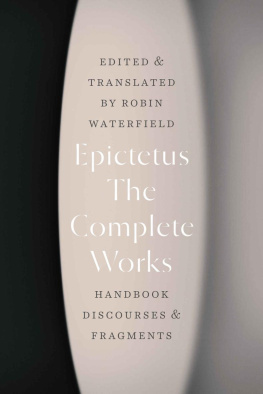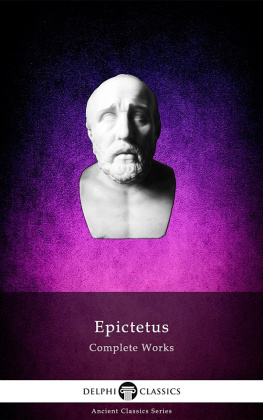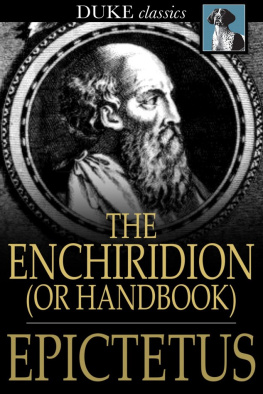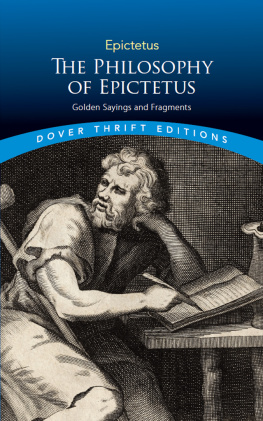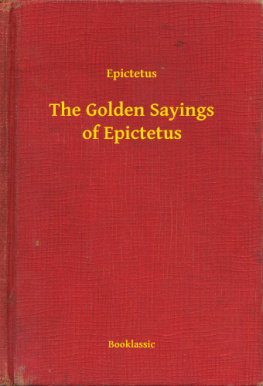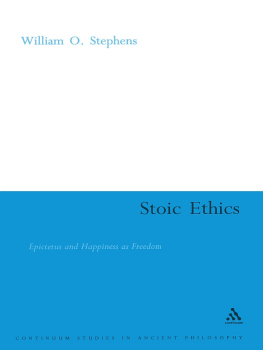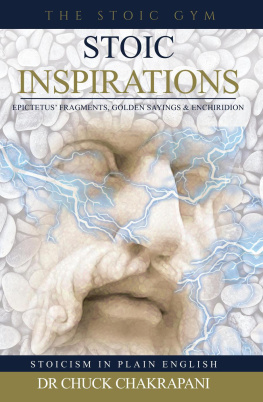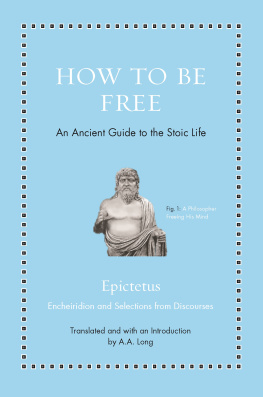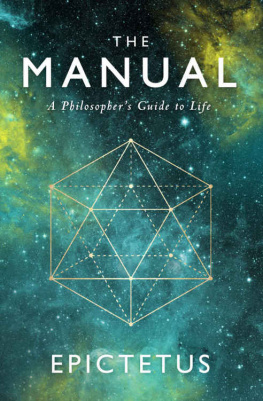Contents
Discourses : Book 1
Discourses : Book 2
Discourses : Book 3
Discourses : Book 4
NOTE ON THE AUTHOR, EDITOR AND TRANSLATOR
Epictetus (AD 55-135) was one of three men from whom significant writings on Stoic philosophy survive from the first to second centuries AD, the others being Seneca (c. 4 BC-AD 651 and Marcus Aurelius (AD 121-80). Unlike Seneca, adviser to was born a slave, in Hieropolis in Phrygia (now Turkey), a the emperor Nero, and Marcus Aurelius, the emperor, Epictetus Greek-speaking province of the Roman empire. He came to Rome and was the slave of Epaphroditus, an immensely powerful and wealthy freedman of Nero, who eventually gave Epictetus his freedom. While still a slave, Epictetus studied Stoic philosophy with Musonius Rufus, and became at some point a Stoic teacher himself in Rome. When the emperor Domitian banished philosophical teachers from Rome in AD 89, Epictetus set up a philosophical school or study-centre in Nicopolis in Greece. Nicopolis, on the Adriatic coast, was on the main route between Rome and Athens; and many distinguished Greeks and Romans visited his school. One of these was Arrian (full name Lucius Flavianus Arrianus Xenophon), a Roman citizen from Bithynia who studied with Epictetus c. 107-9 before becoming a leading Roman politician and historian. He is best known for his histories of the campaigns of Alexander the Great. Epictetus wrote nothing; the Discourses are Arrian's written version of Epictetus' teachings. Epictetus' school became famous, the emperor Hadrian visited him, and Marcus Aurelius, after Epictetus' death, placed high value on his written teachings. Apa from his teachings, little is known of his life, except that he became crippled, probably from rheumatism, lived a life of great simplicity, and married at a late age to help bring up a who would otherwise have been left to die.
INTRODUCTION
1 Epictetus was one of the best-known Stoic philosophers in the priod of the Roman empire. His teachings, preserved by Arrian, combine compelling directness with moral rigour in a way that has commanded interest from his own day to the present. He aims to provide philosophically based guidance on fundamental human problems. Above all, he gives forceful expression to the Stoic view of how to confront pain, disaster, and death without loss of peace of mind.
The Form and Purpose of the 'Discourses'
2 All the writings in this volume are based on Arrian's versions of Epictetus' philosophical teachings. Four books of Discourses (Greek title Diatribai) survive intact (out of at least eight thought to have been written by Arrian). The Handbook (Greek title Encheiridion) is a selection by Arrian of extracts from these versions of Epictetus' teachings; about half of them are drawn, with small modifications, from the four surviving books of Discourses. The Fragments are short passages drawn from other ancient works, which also seem to derive from Arrian's writings. 3 Arrian tells us why he prepared these writings in the letter which was attached in ancient times as a preface to the Discourses (p. I below). Despite what he says there, they are probably not word-for-word reports of specific conversations, but rather Arrian's own attempts to recreate the characteristic form and style of Epictetus' mode of teaching. They are written in koine, the everyday Greek used widely throughout the eastern part of the Roman empire at this time, rather than in the educated Greek used by Arrian in his other works. The compressed, jagged and urgent style, punctuated by commands and questions, is also unlike Arrian's style elsewhere, and is clearly designed to let readers hear Epictetus' own voice.
4 Epictetus presumably offered formal instruction in logic, physics and ethics, which were seen by the Stoics as three interconnected branches of philosophical study. His discourses refer to the writings of Zeno (334-262 BC), Cleanthes (331-232 BC), and Chrysippus (C. 280-c. 206 BC), the Greek thinkers who laid the basis of Stoicism as a systematic philosophy. But the Discourses are not based on this type of formal instruction. They represent half-formal talks, sermons or counselling sessions, in which Epictetus summed up the practical implications of living a life shaped by Stoic ethical principles. These talks were given in the school, but visitors are sometimes presented as taking part, consulting Epictetus or being questioned by him; so they constitute semi-public forms of discourse, tackling ethical issues relevant to all human beings. 5 All Greek and Roman thinkers saw ethical philosophy as designed, ultimately, to have a practical effect, that of helping people to lead better lives; and some of them developed special types of discourse to draw out the practical implications of their philosophy. Socrates (469-399 BC), the first Greek thinker to focus wholly on ethics, used a unique method of systematic cross-examination, by which he induced his partners in dialogue to rethink the beliefs on which they based their lives. The character and teaching-method of Socrates served as an ideal for many ancient thinkers. These included the Cynics, the first of whom was Diogenes (c. 400-c. 325 BC), who rejected conventional lifestyles and lived as street-teachers or preachers, communicating their ethical message in public places. The Cynic lecture or diatribe' used vivid examples, quotations and pointed sarcasm to convey its ethical message. Epictetus presents both Socrates and the Cynic teachers as ideal figures, and his Discourses (Diatribes' in Greek) are clearly inspired by the Cynic and Socratic modes of teaching. But Epictetus' discourses also reflect the systematic and dogmatic character of Stoic philosophy; they state and restate a limited set of key themes in a powerful, reiterative manner.' 6 In the Hellenistic Age (32331 BC) and under the Roman empire (31 BC onwards), ancient philosophers often drew an analogy between ethical philosophy (in its practical role) and medicine. For instance, Philo (c. 110-c. 79 BC) subdivides practical ethics into protreptic (persuading someone to engage in philosophy), therapy (removing the false beliefs which cause distress), and advice (giving instructions about how to live), and compares each of these functions to aspects of the work of the doctor.' If we apply this framework to Epictetus, most of the discourses count as therapy (doing what Philo calls removing beliefs which cause disease in the critical faculties of the mind and implanting healthy beliefs') and advice (providing instructions about what counts as a 'healthy' life). In ancient philosophy, the use of the medical analogy is typically combined with the assumption that it is the doctor of the mind and not the patient who is competent to decide what counts as sickness and health. It is also combined with the idea that the crucial factor in gaining health of the mind (i.e. happiness, eudaimonia in Greek) lies in forming a correct understanding of the proper goal of human life, which can then shape the whole pattern of a person's beliefs, emotions and desires. Epictetus' discourses are clearly designed to be therapeutic' or 'advisory' in a way that reflects this understanding of philosophy as the medicine of the mind. Epictetus and Stoicism
7 Stoic philosophy had a long history (from the early third century BC onwards), and, although there was a clearly defined overall framework, different thinkers took up different positions within this framework. Epictetus is a generally orthodox Stoic, maintaining the standpoint of the three founders of Stoicism: Zeno, Cleanthes and Chrysippus. He also offers a relatively tough, idealistic version of orthodox Stoicism? His attitude comes out clearly if we look at his views on human freedom and responsibility, on what is valuable, and on doing appropriate acts:
Some things are up to us and others are not. Up to us are opinion, impulse, desire, aversion and, in a word, whatever is our own action. Not up to us are body, property, reputation, office and, in a word, whatever are not our own actions. (Handbook 1)
Next page
